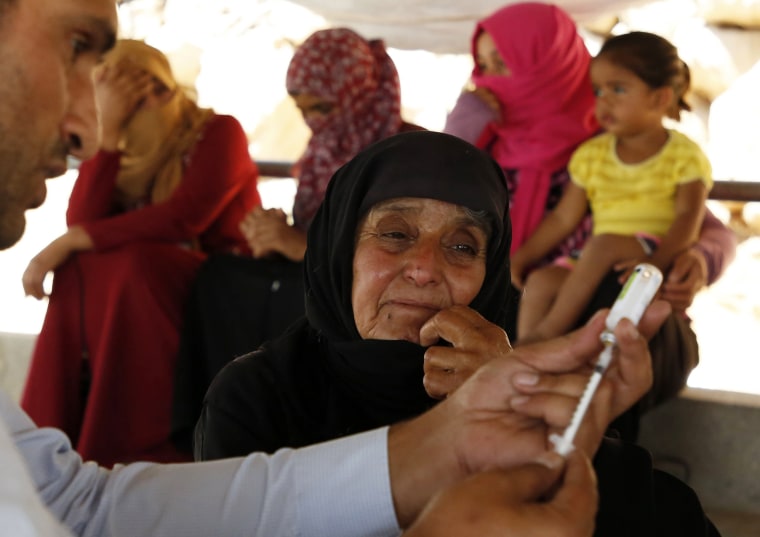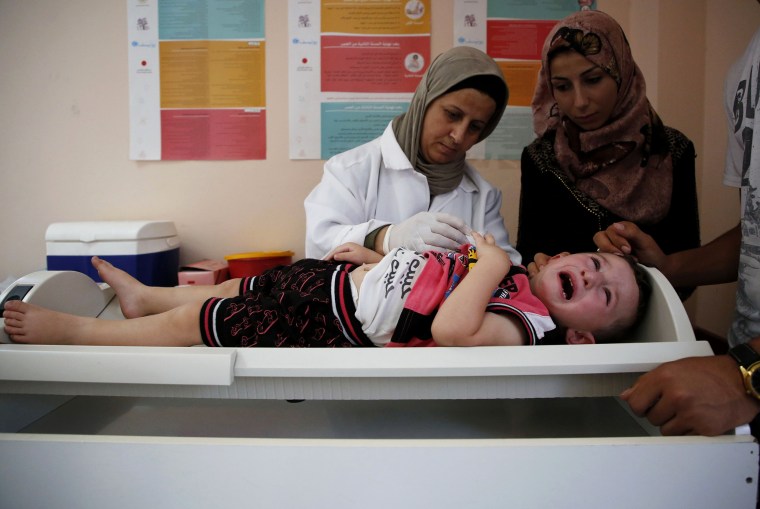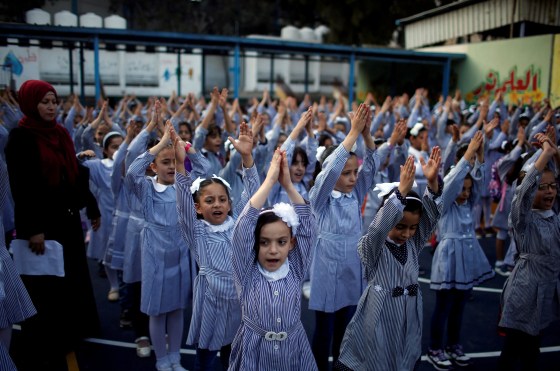JERUSALEM — The Trump administration is cutting funding to the United Nations relief agency for Palestinian refugees, raising fears that programs already straining to help some 5.4 million people will collapse.
A State Department statement Friday announcing the dramatic change in American policy called the U.N. Relief and Works Agency (UNWRA) an "irredeemably flawed operation." It also pinned the blame on other countries for not doing enough to support Palestinian refugees.
But the chief spokesman for UNRWA, which provides schooling, health services and food assistance to refugees in the occupied West Bank, the Gaza Strip, Syria, Jordan and Lebanon, said U.S. criticism of the agency was unfair and unfounded.

"These very programs have a proven track record in creating one of the most successful human development processes and results in the Middle East," said UNRWA spokesman Chris Gunness. "The international state community, our donors and host countries have consistently praised UNRWA for its achievements and standards."
Later on Friday, a spokesman for U.N. Secretary-General António Guterres released a statement that also pushed back against the Trump administration's claim that the agency is inefficient, and called on other countries to fill the gap left by the United States.
"We regret the United States’ decision to provide no further funding to UNRWA, which provides essential services to Palestine refugees and contributes to stability in the region," the statement said. "The U.S. has traditionally been the largest single contributor to UNRWA. We appreciate its support over the years."
Saeb Erakat, secretary general of the executive committee of the Palestine Liberation Organization (PLO), called on the international community to "reject and condemn the American decision and provide all necessary assistance to UNRWA to enable it to continue to shoulder its responsibility towards the Palestinian refugees."
UNRWA was set up to serve Palestinians driven from their homes after the creation of Israel in 1948. In 2017, the United States covered about a third of the agency's budget of $1.1 billion. In January, the Trump administration provided $60 million compared to $364 million in 2017, and called on Palestinians to restart peace talks with Israel.
Friday's decision comes as President Donald Trump's son-in-law and senior adviser Jared Kushner tries to craft a peace plan meant to launch negotiations between Israel and the Palestinians. The Palestinian leadership cut off direct links with the Americans in November last year, and on Aug. 25 the U.S. announced it was cutting more than $200 million in aid to the Palestinians.
"The fundamental business model and fiscal practices that have marked UNRWA for years — tied to UNRWA's endlessly and exponentially expanding community of entitled beneficiaries — is simply unsustainable," the State Department statement said.
Key to the administration's criticism of UNRWA is the way it counts the descendants of refugees as refugees themselves.
By undermining UNRWA, the administration is attempting to remove a pervasive Palestinian belief in the "right of return" — the conviction that refugees will one day be able to go back to their ancestral homes.
UNWRA "nurtures unrealistic expectations that are jamming up the peace process," one Republican congressional staffer told NBC News familiar with the administration's thinking on condition of anonymity. "It takes the right of return off the table."
The administration and its allies in Congress also claim that the agency is biased against Israel, overestimates the number of refugees and wastes money. Republican lawmakers sparred with President Barack Obama on this issue and have been pushing for such a decision on UNRWA.

But the decision will not be universally welcomed in Israel, where some in the military have warned that a reduction of services could lead to unrest. Another fear is that Hamas — the militant group that runs Gaza — will step into the void left by UNRWA.
Others in Congress raised the alarm after the announcement.
Ending the funding, "especially against the recommendation of Israeli defense officials, will be devastating to the lives of millions of Palestinians — 526,000 of which are students in UNRWA schools," Sen. Tim Kaine, D-Va., said in a statement.
The member of the Armed Services and the Foreign Relations committees added that it will "increase instability in a region already reeling from wars and humanitarian crises."
Even before the announcement, UNRWA in Gaza warned that schools there could close and the primary educational system could collapse altogether if money wasn't found to cover its deficits.
Earlier, UNRWA Gaza spokesman Adnan Abu Hasna told a local radio station that the collapse of the school system could cause a "disaster" and would likely undermine security in the strip.
Life in Gaza, which is ruled by militant group Hamas and under an Israeli-Egyptian blockade, has become increasingly intolerable for many of its 2 million residents — 70 percent of whom are themselves refugees.
Almost none of the water is clean, raw sewage is pumped straight into the sea, and worsening power shortages mean Gazans have electricity for only about four hours a day on average. Unemployment rates are close to 50 percent — more than 65 percent among those under 30, officials say.
Yasser Abu Jamei, the executive head of the Gaza Community Mental Health Program — the largest independent mental health network in the strip — and who has a unique insight into dramatically deteriorating conditions there, warned that further cuts to UNRWA will be seen as a great injustice by residents.
"If the international community allows this to happen, it will be in trouble not just in Gaza but other places," he said.
"The world is getting very dark," he added. "We have suffered enough of that at the beginning of 20th century. We have to stop moving toward the dark side and return to the right way."
F. Brinley Bruton reported from Jerusalem, and Dan De Luce from Washington.


